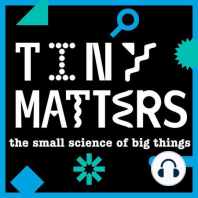1 min listen

Let's talk about love: Is oxytocin really the 'love drug'? How do we stay in love? And how do our brains adapt to the deaths of people we love?
FromTiny Matters
Let's talk about love: Is oxytocin really the 'love drug'? How do we stay in love? And how do our brains adapt to the deaths of people we love?
FromTiny Matters
ratings:
Length:
26 minutes
Released:
Feb 7, 2024
Format:
Podcast episode
Description
Love is everywhere: In friendships, in romance, in the songs we listen to, books we read, and movies we see. So whether you love love, hate love, or are somewhere in between, you’re still hearing about it all the time. And that means you’ve probably learned about a molecule called oxytocin, aka the ‘love hormone’ or ‘love drug.’Oxytocin was at first considered a hormone strictly for childbirth and nursing. But, starting around 50 years ago, research began to shed light on the vastness of its importance, in part with the help of cute little animals called prairie voles, one of very few species in the animal kingdom who form monogamous bonds.In this episode, Sam and Deboki unpack what we've learned oxytocin can and can't do, why you can't reduce love down to a single molecule, what happens when we not only fall in love but stay in love, and how our brains adapt to the loss of a loved one. Links to the Tiny Show & Tell stories are here and here. Pick up a Tiny Matters mug here! All Tiny Matters transcripts are available here.
Released:
Feb 7, 2024
Format:
Podcast episode
Titles in the series (67)
Tiny Matters: A new science podcast launching in 2022: Tiny Matters is a science podcast about things small in size but big in impact. Every other Wednesday, join hosts Sam Jones and Deboki Chakravarti as they unpack the little stuff that makes the big stuff in our world (both good and bad)... by Tiny Matters